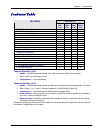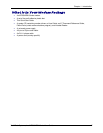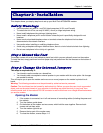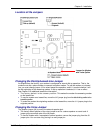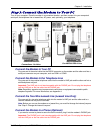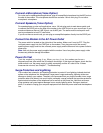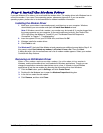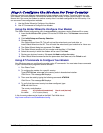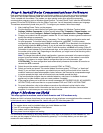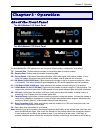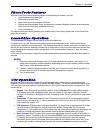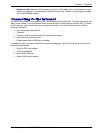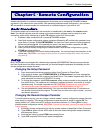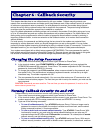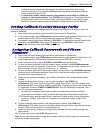
Chapter 2 - Installation
Multi-Tech Systems, Inc. MT5634ZBA-Series User Guide 14
Step 6: Install Data Communications Software
Data communications software is designed to configure a modem so it can send and receive messages.
Your Multi-Tech modem operates under the control of a data communications program, such as Phone
Tools, included with the modem. The modem can also operate under other general-purpose data
communication programs, such as Windows HyperTerminal. To install Phone Tools, insert the MT5634ZBA
system CD into the CD-ROM drive; click the Phone Tools icon. You will be asked to choose your language.
The software automatically loads onto your PC. To configure your modem, follow these steps:
1.
After installing Phone Tools, run the program.
2.
Find the dialog box or menu that lets you select your modem. (In Windows Terminal select
Settings | Modem Commands; in HyperTerminal select File | Properties | Phone Number; and
in PhoneTools select Configure | General Configuration | Communication | Change Modem.
3.
Choose your modem from the program’s modem list. If it isn’t listed, choose a generic modem and
modify the settings as necessary.
4.
Change the modem initialization string, if necessary. The factory default configuration works well
for most purposes. To load the factory default configuration, use AT&F. To load a custom
configuration that was saved using the &W command, use ATZ. For a Macintosh, the initialization
string should include the &D0 command. If you do not want the modem to always answer the
phone, add S0=0 to the string. To use Caller ID with the modem, add S0=2 to the string (Caller ID
information is sent between the first and second rings, so the phone must ring at least twice before
the modem picks up the line). Depending on the software, you might have to end the string with a
carriage return character (^M).
Note: To change the modem’s default configuration, type new commands in the communication
program’s terminal window, adding the &W command to store them in the modem’s nonvolatile
memory. For instance, to create a default configuration that turns off autoanswer, type
AT&FS0=0&W. The new configuration loads automatically whenever the modem is turned on or
receives the ATZ command.
5.
Select the port the modem is connected to (normally COM1 or COM2).
6.
Select your serial port speed. This can be labeled “maximum speed,” “DTE bps,” or “baud rate.”
Ideally, if you use data compression, you should set your serial port baud rate to four times the
modem’s maximum transmission speed or faster; however, few files can be compressed enough
to require speeds that high, and not all serial ports can handle speeds that high.
7.
If the communication program has an autobaud selection, make sure it is disabled. Autobaud
applies only to older modems, and can cause problems if enabled.
8.
If the program allows you to edit the no-connect messages (NO CARRIER, BUSY, NO ANSWER,
NO DIALTONE), make sure there is no space between DIAL and TONE in NO DIALTONE.
9.
For more information, refer to the software manuals or the software’s online help for other
configuration choices and for information on how to use the modem with other communication
programs. In most cases you can accept the default values.
Step 7: Modem-on-Hold
This step applies to modems used in North America and V.92 modems only.
Modem-on-Hold is a feature that allows you to manage all your telephone communications while connected
to the Internet over a single telephone line. Load it onto your PC from the system CD.
Important:
1. The modem driver must be installed before you install Modem-on-Hold.
2. Your ISP must support the Modem-on-Hold feature.
3. Your modem must be support V.92.
4. Your phone line must support call waiting.
For information about setting up and using Modem-on-Hold, refer to the Modem-on-Hold ReadMe file. You
can also use the program’s online Help accessed by pressing F1 or the Help button; you can also right-
mouse click on a menu item.



